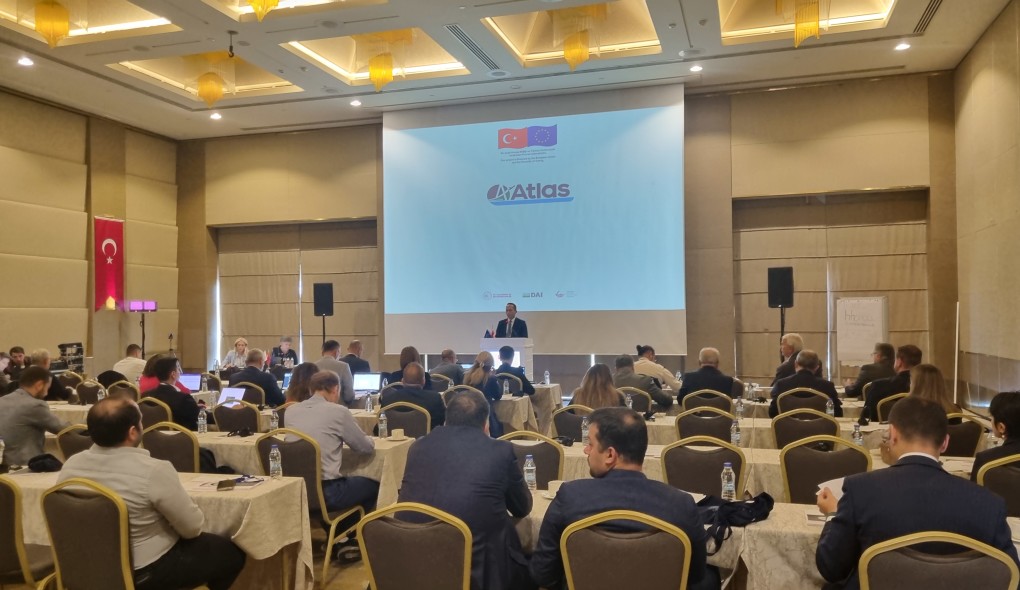
Within the scope of the ATLAS Project, the Transport
Legislation Gap Analysis and Gap Plugging Workshop was held in Istanbul on
3-4-5-6 October.
Industry experts, project
stakeholders, and academics, who were participants during the workshop, had the
opportunity to discuss the findings and recommendations identified in the
legislation of Road, Railway, Maritime, and Aviation under the themes of Internal
Market, State Aid and Competition, Safety and Security, Social Legislation,
Environment and Climate Change, Transportation Synergy, and Other Sectoral Issues.
The workshop, which began
with the opening speech of Mr. Mustafa İMAMOĞLU, Head of International Politics
Department in Directorate General for European Union and Foreign Relations of Ministry
of Transport and Infrastructure focused on the specified themes related to Road
Legislation on the first day. During the sessions to which, Mr. Murat Mustafa HARMAN,
Deputy Head of Department at the Ministry of Transport and Infrastructure, Mr.
Mehmet Erdem ATILGAN from the Directorate General of Regulation of Transport
Services, and Mr. Zafer AYDIN from the Directorate General of Security
participated and contributed, the discussions included the classification of
serious violations in road transport, national electronic records for road
transport enterprises, road-based public passenger transport services, initial
qualifications and periodic training for drivers of specific road vehicles
(Professional Driver CPC), harmonization of certain social legislation related
to driving and rest times in road transport, passenger rights in bus and coach
transport and etc.
On the second day of the
workshop, activities focused on Railway Legislation. The workshop, attended by
Mr. Serdar ASLAN, Head of Marketing and Sales Department at TÜRASAŞ, Mr. Ömer TANGÜL,
Head of Department at the Directorate General of Regulation of Transport
Services, and Mr. Orhan SAKAR, Branch Manager at the Directorate of Strategy
and Corporate Development of TCDD, addressed mainly the topics of the railway network for competitive freight
transport, establishment of a single European railway area, certain aspects
related to licensing procedures for railway operators, reporting obligations
within the framework of monitoring the railway market, calculation of the costs incurred of train services,
railway-based public passenger transport services and other related issues.
On the third day of the
workshop, which was conducted with the participation of Mr. Durali İŞLER, Head
of Department at the Directorate General of Maritime Safety, Mr. Hakan DEMİRLİOĞLU,
Head of Department at the Directorate General of Shipyards and Coastal
Structures, and Mr. Serkan PULAT, Head of Unit, the discussions included (but
not limited to) the freedom to provide maritime transport services,
unrestricted access to cargoes in ocean shipping, cabotage and international
tramp services, transfer of records between cargo and passenger ships, common
rules regarding financial transparency of ports, maritime safety and security,
marine waste management and ship recycling and many other issues in the sector
On the fourth and final day
of the workshop, discussions related to Aviation Legislation took place with
the participation of Ms. Özlem SALİHOĞLU, Chief of International Relations and
Alliances at Turkish Airlines, Mr. Feyzullah ÇINAR, Head of Department at the
Directorate General of Civil Aviation, and Mr. M. Sefa CEYHAN. Critical issues
were addressed, including but not limited to the negotiations and
implementations of air service agreements between European Union member states
and third countries, allocation of slots, technical requirements for civil
aviation flight crews and regulations related to airports, greenhouse gas
emission allowance trading, The Aviation Legislation Workshop was concluded
with the examination of various sectoral issues, including airspace
utilization, air traffic management, flight data exchange protocols, and
performance-based navigation.



